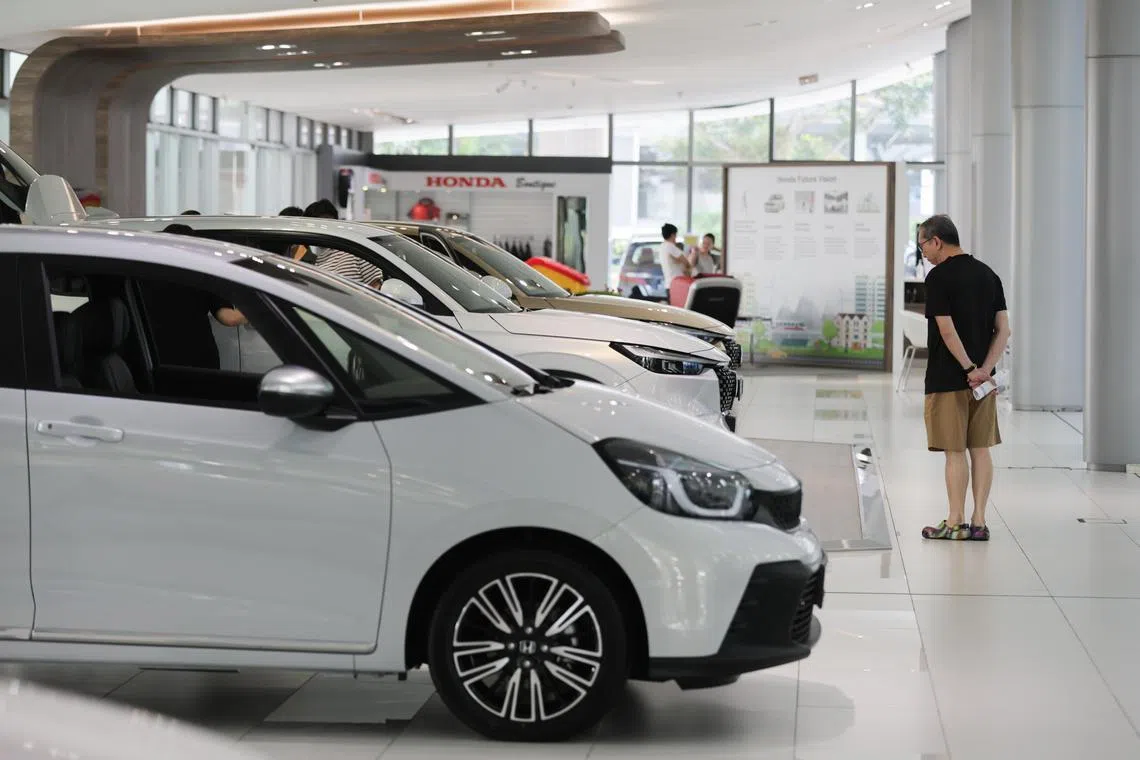COE prices end mixed, with premium for larger cars down 1.4% to $100,901
Sign up now: Get ST's newsletters delivered to your inbox

The Category A COE premium inched upwards, while the price of a Category B certificate dipped.
PHOTO: ST FILE
Follow topic:
SINGAPORE – Certificate of entitlement (COE) prices ended mixed on July 3, with the premium for larger cars dipping after a rebound for both car categories in the previous round.
The COE premium for smaller cars, though, continued to inch upwards.
At $91,001, the price of Category A COEs, meant for smaller, less powerful cars and electric vehicles (EVs), was $112 – or 0.1 per cent – higher than the $90,889 in the previous exercise.
This means prices of smaller cars are likely to stay high, as listed vehicle prices usually include the COE, which gives people the right to own and use a vehicle here.
The premium for Category B COEs, meant for larger, more powerful cars and EVs, dipped 1.4 per cent to end at $100,901, from $102,334.
The latest result means that the gap between the two car COE categories stands at $9,900, compared with around $30,000 in 2022 and 2023.
The growing number of EVs in Category A was cited by various industry insiders as the main reason for the premium closing in on that of Category B.
The price of Open category (Category E) COEs, which can be used to register any vehicle type other than motorcycles, ended at $100,889 – 0.9 per cent higher than $100,000 before. These certificates are almost always used to register bigger, more powerful cars.
The motorcycle COE premium (Category D) was down 1.1 per cent to $8,900, from $9,002.
For commercial vehicles (Category C), the COE premium ended at $70,001 – 0.1 per cent higher than the previous price of $69,900.
Many dealers expected the Category A COE premium to stay high, driven by the arrival of a new version of the BYD Seal EV, which qualifies for this category with its lower power output. It is priced $28,000 below the next cheaper version of the EV, which is a Category B COE car.
The new variant of the BYD saloon joins an increasingly crowded COE category. Before the Seal’s arrival in June, US brand Tesla launched the Category A COE version of its Model 3 EV. This category of COEs already includes offerings from premium brands such as BMW and Lexus, which carry higher price tags, and the companies can afford to put in higher bids to secure COEs.
Ms Sabrina Sng, managing director of sports car brand Lotus and EV brand Polestar at Wearnes Automotive, said the increasing number of Category A COE car models may have contributed to the fall in the number of bids entered for Category B as buyers opt for less powerful premium-brand cars and EVs.
The latest tender saw the fewest number of bids entered for Category B COEs – 896 – since the first exercise of 2024. For comparison, the past six exercises drew an average of 1,089 bids.
At 1,429, the number of bids in Category A was similar to those in the previous four exercises.
South Korean carmaker Hyundai launched its Santa Fe sport utility vehicle, a Category B COE car, in June.
Mr Ng Choon Wee, commercial director of Hyundai distributor Komoco Motors, said his company has started bidding to secure COEs in this round in preparation for the bulk of the units it has sold, which are arriving only in the next two months or so.
Ms Corinne Chua, Volvo managing director at Wearnes Automotive, believes that some dealers may be replenishing their stock of Open category COEs in preparation for the three-week gap between the second bidding exercise in July and the first tender in August. The gap is typically two weeks.
Secured Open category certificates can be held for three months.


